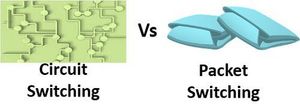In this article we'll be comparing Circuit Switching vs Packet Switching.
Compare Circuit Switching with Packet Switching
Circuit Switching and Packet Switching are two of the main approaches to move data through a network of links and switches. The main difference between them is that circuit switching reserves the resources needed for communication for the duration of the communication session between two end users.
What are the pros/cons of each approach?
Packet switching
Cons
Subject to unpredictable queuing delays
Pros (compared to circuit switching)
Better sharing of transmission capacity
Simpler, more efficient and less costly to implement
Allows a larger number of simultaneous users
Circuit switching
Cons (compared to circuit switching)
Less efficient because it doesn't take into account the user's inactivity during the communication session. User might need a large amount of resources but use it for only 10% of the communication session. Circuit switching will allocate these resources for the entire time not only the 10% when it is needed.
Doesn't support of simultaneous users for the same reason stated above.
Pros
No unpredictable queuing delay
The analogy presented by the book to illustrate these pros and cons is that of two restaurants one that takes reservations (circuit switching) and one that doesn't (packet switching).
For the restaurant that takes the reservation you must call in advance and they will make an assessment of how many tables are reserved, if all are reserved you will be denied a table without taking into account people who might not show up or people who will be finished quickly. But, if you get the reservation you are assured there will be no wait time when you arrive.
For the restaurant without reservations you don't have to call in advance and you can be seated at a table once any of them free up, but the time you may have to wait is unpredictable.


